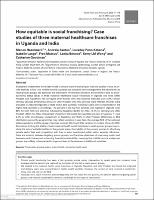Browsing by Subject "Reproductive health"
Now showing items 1-2 of 2
-
How equitable is social franchising? Case studies of three maternal healthcare franchises in Uganda and India
(Oxford University Press in association with The London School of Hygiene and Tropical Medicine, 2018-04-01)
Substantial investments have been made in clinical social franchising to improve quality of care of private facilities in low- and middle-income countries but concerns have emerged that the benefits fail to reach poorer groups. We assessed the distribution of franchise utilization and content of care by socioeconomic status (SES) in three maternal healthcare social franchises in Uganda and India (Uttar Pradesh and Rajasthan). We surveyed 2179 women who had received antenatal care (ANC) and/or delivery services at franchise clinics (in Uttar Pradesh ... -
Self-assessment of attitudes towards conditions to provide safe abortion among new medical graduates in Thailand, 2018: an application of cross-sectional survey with factor analysis
(2021-07-21)
Background: Unsafe abortion is one of the major public health problems in Thailand. Although the penal code of Thailand and the Thai Medical Council permit doctors to perform safe abortion in certain conditions, little is known about the attitudes that new medical doctors have towards abortion. The objectives of this article are to explore the attitudes towards abortion in certain conditions among new medical graduates and to identify factors related to those attitudes. Methods: A cross-sectional survey was conducted in 2018 among 2017 medical ...


